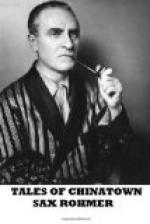“I had to gang awa’,” he explained thickly; “he was temptin’ me to murder him. I should ha’ had to do it if I had stayed. Damn his hell-music.”
Tcheriapin revisited Dr. Kreener on many occasions afterward, although for a long time he did not bring his violin again. The doctor had prevailed upon Andrews to tolerate the Eurasian’s company, and I could not help noticing how Tcheriapin skilfully and deliberately goaded the Scotsman, seeming to take a fiendish delight in disagreeing with his pet theories and in discussing any topic which he had found to be distasteful to Andrews.
Chief among these was that sort of irreverent criticism of women in which male parties so often indulge. Bitter cynic though he was, women were sacred to Andrews. To speak disrespectfully of a woman in his presence was like uttering blasphemy in the study of a cardinal. Tcheriapin very quickly detected the Scotsman’s weakness, and one night he launched out into a series of amorous adventures which set Andrews writhing as he had writhed under the torture of “The Black Mass.”
On this occasion the party was only a small one, comprising myself, Dr. Kreener, Andrews and Tcheriapin. I could feel the storm brewing, but was powerless to check it. How presently it was to break in tragic violence I could not foresee. Fate had not meant that I should foresee it.
Allowing for the free play of an extravagant artistic mind, Tcheriapin’s career on his own showing had been that of a callous blackguard. I began by being disgusted and ended by being fascinated, not by the man’s scandalous adventures, but by the scarcely human psychology of the narrator.
From Warsaw to Budapesth, Shanghai to Paris, and Cairo to London he passed, leaving ruin behind him with a smile—airily flicking cigarette ash upon the floor to indicate the termination of each “episode.”
Andrews watched him in a lowering way which I did not like at all. He had ceased to snort his scorn; indeed, for ten minutes or so he had uttered no word or sound; but there was something in the pose of his ungainly body which strangely suggested that of a great dog preparing to spring. Presently the violinist recalled what he termed a “charming idyll of Normandy.”
“There is one poor fool in the world,” he said, shrugging his slight shoulders, “who never knew how badly he should hate me. Ha! ha! of him I shall tell you. Do you remember, my friends, some few years ago, a picture that was published in Paris and London? Everybody bought it; everybody said: ’He is a made man, this fellow who can paint so fine.’”
“To what picture do you refer?” asked Dr. Kreener.
“It was called ‘A Dream at Dawn.’”
As he spoke the words I saw Andrews start forward, and Dr. Kreener exchanged a swift glance with him. But the Scotsman, unseen by the vainglorious half-caste, shook his head fiercely.
The picture to which Tcheriapin referred will, of course, be perfectly familiar to you. It had phenomenal popularity some eight years ago. Nothing was known of the painter—whose name was Colquhoun—and nothing has been seen of his work since. The original painting was never sold, and after a time this promising new artist was, of course, forgotten.




